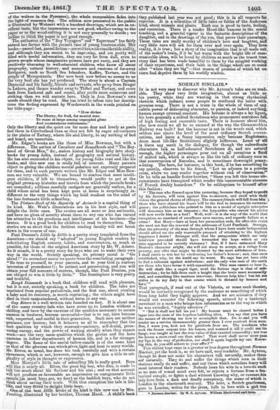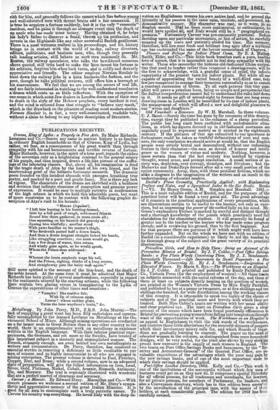NORMAN SI1CLA.I11.
IT is not very easy to discover why Mr. Aytoun's tales are so read- able. They show very little imagination, almost as little as his poetry, while they are wanting in that strong rhythmical rhetoric which induces some people to confound the latter with genuine song. There is not a trace in the whole of them of any subtle power of delineating character, or passion, or indeed anything human except external conduct. His heroine is always a lay figure his hero generally a stilted Scotehman who pronounces sentences full. of high feeling and execrable taste. There is humour about him, else how could we all be so amused at the way the Glenmutchkin. Railway was built? but the humour is not in the words said, which seldom rise above the level of the most ordinary Scotch conver- sations, and leave a funny. impression only. because Englishmen deem most life-like Scotticams slightly ludicrous. Least of all is there any merit in the dialogue, for though the subordinate characters talk as half-educated Scotchmen do, and are natural enough, the higher personages pour out on all occasions a flood of stilted talk, which is always as like the talk of ordinary men as that conversation of Rasselas, and is sometimes downright penny- alining. The hero, for instance, in this book, if he has something to. say quietly, observes to his friend, "Let us adjourn to a private- room, where we may confer together without risk of observation." Or he tells an humble foster-brother, "Since you left this house cir- cumstances have transpired which render this unaccountable absence of Pocock doubly hazardous." Or he soliloquizes to himself after this fashion: "'The men who fawned upon him yesterday, because they hoped to profit by his favours will turn against him to-morrow, and swell with their voices the general chorus of obloquy. The summerfriends will fall from him ; those who have shared his feasts will be the first to denounce his extrava- gance • the politicians who pointed to him as a model of upright enterprise will denounce him as an impostor; the hypocrites who craved his advice will now revile him as a fool! Well, well—it is the way of the world that recognizes no standard of excelleuce save success, and regards failure as a crime ! But Mary—here at least her persecution ends, for after this event she need not fear the renewal of the addresses of Lord Pentland. Strange, that the adversity of the man through whom I have been made independent should afford me the only reasonable prospect of attaining to the highest happiness I desire ! Stranger still, that the antagonism which our only interview provoked should have forwarded the hope which at one time appeared to be entirely visionary! But, if I have estimated Mary Beaton's character aright, she will not stoop to accept, as a refuge from poverty, any offer that might be dictated by the mere eehishness of love. I shall strive to win her by vindicating her father's honour ; and, that once established, why, let the world say its worst. No sage has yet been able to find a talisman against misfortune; and the only wise men of the earth are those who have borne it with equanimity. This man cannot so bear it. He will chafe like a caged tiger, until his furious rage is that of said- destruction; for he falls from such a height that the brain must necessarily reel, and something like madness intervene. Heaven help bins! but let me strive to do my duty in that course which is dictated by honour and That paragraph, if read out at the Victoria, or some such theatre, would be instantly recognized by the audience as something of which from long habit they highly approve. And we are mistaken if they would not consider the following speech, uttered by a bankrupt merchant to a man who brings him information as to the way in which he was swindled, "highly effective :" But it shall not fail me yet' My honour must be cleared before lapse into the state of the hopeless babbling idiot. You say that you have the means of showing me how to accomplish that. Do so and you will render me a service immeasurably greater than I ever received from man. But, I warn you, look not for gratitude from me. The woodman who took the frozen serpent into his bosom, and warmed it till it could use its fangs, was taught at last the true value of that vaunted commodity; nor was his lesson a more cruel one than mine! That word shall never more paaa my lips in the way of profession, nor shall it again beguile my ear. Know- ing this, do you still adhere to your offer?'" This stilted tone runs in a greater or less degree throughout Norman Sinclair, yet the book is, as we have said, very readable. Mr. Aytoun, though he does not make his characters talk naturally, makes them act naturally. They do and suffer the things which men in their stations really do and suffer, and not those which novelists fancy will most interest their readers. Nobody loses his wits in a love-fit such as no man of sound mind ever felt, or rejects a fortune from a fan- tastical scruple, or fights a duel without knowing why, or rescues his lady-love from a dark and deadly conspiracy, the scene of which is London in the nineteenth century. The hero, a Scotch gentleman, goes to London, writes for the press, falls in love with a girl too
• .Norman fiy W. E. Aytoun. William Blackwood and Sons.
rich for him, and generally follows the career which lies before-young and well-educated men with decent brains and a fair connexion. It is true he acquires a fortune suddenly, but it is the only "romantic" incident, and hegains it through no stranger event than the death of an uncle who has made some money. Having obtained it, he helps his lady's father to discover a fraud, throw s up his profession, and invests in the Highlands like any other successful Scotch gentleman. There is a most welcome realism in his proceedings, and his history brings us in contact with the world of to-day, railway directors, editors politicians, and business meu, who, though they generally talk leading articles, still behave as such men commonly do. Mr. Beaton, the railway speculator, who talks the bewildered nonsense above quoted, still tries hard to make the hero invest his fortune in his schemes, forgives him when luck turns, and is coldly and decently appreciative and friendly. The editor employs Norman Sinclair to hunt down the railway jobs in a keen business-like fashion, and the peer, though he talks political reviews, still offers him a borough at his convenience. We feel that we are among the scenes Of real life, and are fairly interested in watching to the well-understood conclusion a drama which costs us so little reflection.' With the exception of one scene in which some Jew dealers in London doom one of their race to death in the style of the Hebrew prophets, every. incident is real, and the mind is relieved from that struggle to "believe very mach," which is the drawback on the pleasure of reading most modern stories. Norman Sinclair is' in fact, a very well-constructed, readable tale, without a claim to belong to any higher description of literature.































 Previous page
Previous page